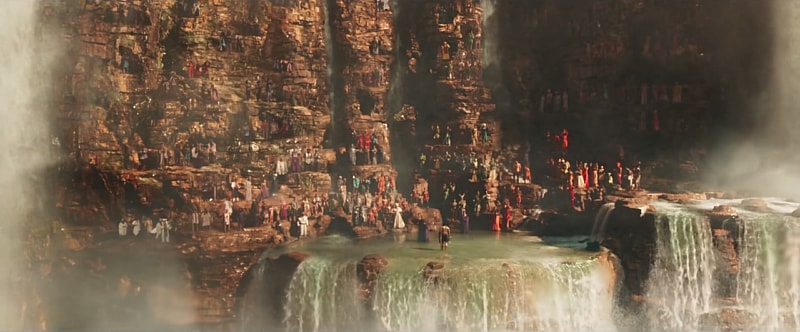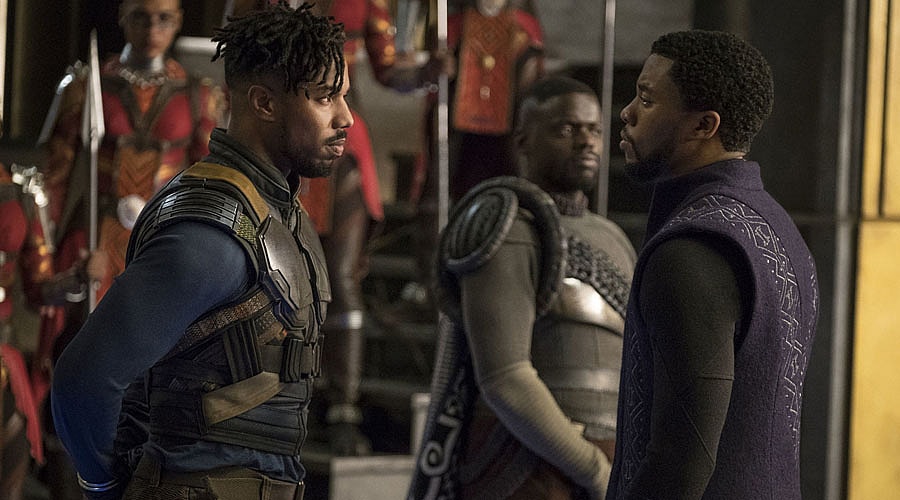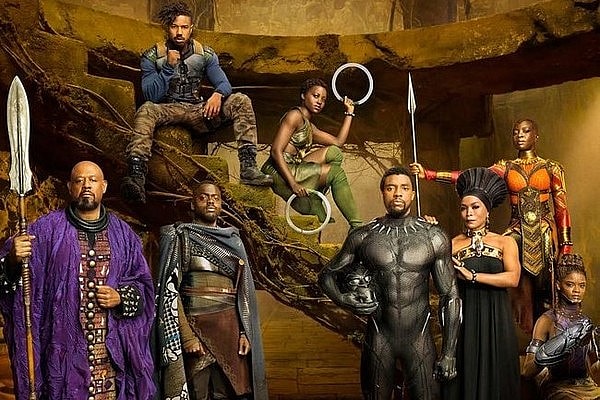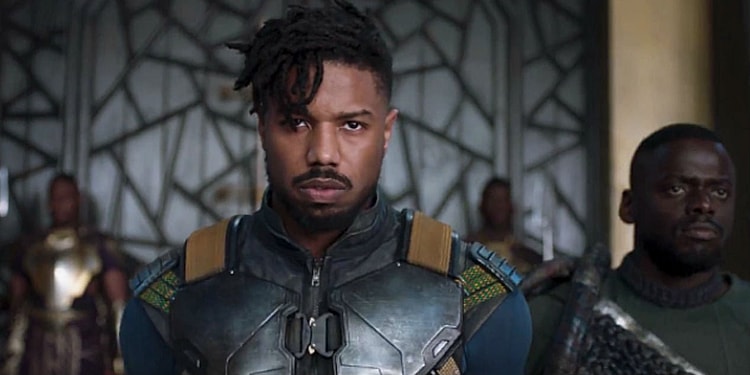Why Black Panther is More Lord of the Rings Than Superhero Movie

Beware of spoilers for Black Panther, ye who enter here
Black Panther is out. Go see it. Seriously. It might just be the best Marvel movie to date; it might be what superhero films will look like in the future. This film is a big deal. But all of that stems from the success of its creative teams, the cast, and crew. The film speaks volumes about race, culture, nationalism, morality, family, identity, destiny, and more. There are so many themes at play in the film it’s staggering. It’s those elements that help Black Panther transcend its genre, in many ways.
Comparing this film to any other Marvel film wouldn’t really do it justice. This is much more comparable to the likes of Batman Begins and the Lord of the Rings films. T’Challa isn’t the Black Panther because he is the most powerful or the biggest. While he does more than his fair share of fighting, that’s not why he’s a good king. The film, above all else, teaches that greed and lust for power lead only to hatred and death. While the villains have clear motivations, there is a clear divide between good and evil.
Sauron was the embodiment of the ultimate evil in the Lord of the Rings. While he was never physically present, it was what others did in his name and because of his promises that make his influence so terrifying. It was an innovative way for Tolkien to personify the pursuit of power in his story. But opposite that was a king destined for greatness. A man almost too virtuous to want real power. Such is T’Challa’s dilemma. He could lead a Wakandan conquest across the world; he could create an empire without end.
But, as most know, with great power comes great responsibility.
Lust for Power
The pursuit of power is a huge motivator for many characters in Black Panther. But much like the One Ring, T’Challa starts the film holding power in his very hands. Unlike films that have characters pursuing trinkets or racing enemies to some happening, our main character has what everyone wants at the beginning of the film. T’Challa is being named king of Wakanda. It’s a glorious day. All is right. Little did he know the world is plotting and menacing around him.
Despite the fact that Black Panther has a great plot, it’s not the focus. Characters are given the real emphasis. T’Challa understands why Killmonger wants his throne; Killmonger has a legitimate claim. This isn’t about what the power is, it’s about who is best to wield it. The film is a test for its main characters, both protagonist and antagonist. It asks them what they would do with power. One would conquer the world; the other decides to try and save it.
National pride is another huge theme at the core of the film. Wakanda is a proud African nation. But because of its wonderful treasures, it’s remained mostly hidden to the outside world. However, African descendants are suffering around the world. A subject that Black Panther is not afraid to address. Both Killmonger and T’Challa decide to share Wakanda’s gifts with the world, but in two very different ways. Killmonger would use that power and responsibility to invade and rapture. He was already making plans for three of the world’s largest cities near the end of the film…
But T’Challa is different. While he starts the film firm in his belief that Wakanda needs to remain to itself, he learns. Through Killmonger, he learns that taking care of your own means reaching out as far as you can.
Nationalism and Isolationism
Wakandans are a very proud people. They have a rich and diverse culture all to themselves. Because despite the fact that they seem to be the most advanced nation in the world, they don’t get out much. Wakanda, like Rohan, is a nation that doesn’t always see the virtue in helping other nations. Both have remained relatively isolated. But their stories are going to change that. War comes to both Wakanda and Rohan. Like any brave nation of fighters, they face it down. They face battle with every bit of valor and bravery that was credited to them.
But facing war and battle does something different to these nations. It’s doesn’t scare them into hiding. It doesn’t force them further into their shells. Instead, they learn from facing down true evil. They learn what it meant to have a few others their helping. In Black Panther both T’Challa and Wakanda itself learn that the world needs its help. As Killmonger points out at the end of the film, if Africa is the first continent then we are all its descendants. An incredible testament by the film and its director Ryan Coogler. That we are all of us connected no matter our size, shape, or color.
However, there is still a great sense of Wakandan pride because this is a story about Wakanda. A beautiful and rich world that the filmmakers painstakingly put on film. It lives and breathes with an identity unlike any other seen on film. An African nation that was able to capitalize on its resources and a haven for thought and technology. But aside from that is a culture that utilizes Africa to the utmost. Wakanda is a rich world because there are so many smaller worlds within it.
Cultures within Cultures

There are 5 different tribes within the Wakandan nation. Each of them has their own identity, their own culture. Each tribe has a representative on T’Challa’s council, audiences get to meet each and every one. In fact, two play vital roles in the plot of the film.
W’Kabi is one of T’Challa’s friends and advisors at the beginning of the film. Played by the Academy Award-nominated Daniel Kaluuya. M’Baku is the head of the more adversarial Mountain Tribe, played wonderfully by Winston Duke. Both characters have significant relationships with Chadwick Boseman’s T’Challa. But how each lives and breathes is indicative of their culture. W’Kabi is a rhino herder. This obviously leads to an awesome scene where he rides a rhino.
M’Baku is the first person to challenge T’Challa in the film. But when he loses, T’Challa basically begs for him to give up rather than force his own death. And so M’Baku does what he never imagined he could, surrender to T’Challa. T’Challa takes an opportunity where he could have made more enemies and instead makes a friend. That’s a king.
M’Baku and W’Kabi are examples of the tribes they represent. Because of the fantastic narrative story structure of the film, they switch places at T’Challa’s side. But M’Baku learns to appreciate the mercy T’Challa grants. W’Kabi does not.
Unworthy

The main conflict of the film centers around Killmonger. He is T’Challa’s cousin, the son of his father’s brother. Unfortunately, his father was killed by King T’Chaka when he was just a boy. Like any good villain, this leads him down the path of revenge. He discovers the destiny he was denied and pursues it. King T’Chaka decided to remove Wakanda from the situation. He left a lonely son with a dead father and no explanation.
Unfortunately, this only led Killmonger down a road of hate and vengeance. He spends his adult life in the military taking lives, only to find his way to the Wakandan throne. But instead of just wanting to kill his cousin and take the throne, Killmonger actually wants to do something with this power. And when W’Kabi backs Killmonger for the throne, he does so because Killmonger delivered what T’Challa couldn’t: the body of Klaue played by Andy Serkis. Klaue had killed W’Kabi’s parents some years before. While both W’Kabi and Killmonger are enraged by the deaths of their families, they genuinely believe they can do something better with power. That T’Challa isn’t the leader he promised to be and needs to be deposed.
Like Civil War before it every dispute has motivation and logic behind it. Though the enemy itself becomes war and conflict, ultimately separating Killmonger and T’Challa as rulers. Like the War of the One Ring, the war is over when conflict is over, not when the other side has been obliterated off the face of the Earth.
But the final connections between these two amazing stories lie in the hearts of their characters.
Warriors and Friends

Everyone has a part to play in Black Panther. No matter how small or lost a character is they will fight to the bitter end. Because this is a conflict that involves everyone in the story; and everyone in the story matters. Perhaps the biggest similarity between the two stories is that every character is a friend and a warrior. It’s significant when they die, it’s significant when they change loyalties. It heightens the drama and creates an incredible chemistry among the entire cast.
Making just one character’s motivations clear and sympathetic is a daunting task. Imagine doing so for the entire cast of Black Panther. But that’s what Ryan Coogler did. His characters root for one another because they believe in one another. They help each other because they love each other. Wakanda feels like a living and breathing world because these actors and characters sell their relationships. Sometimes their allegiances change despite the fact that they love one another, like W’Kabi and Okoye. Sometimes they judge someone they respected because of a new revelation, like T’Challa and his father T’Chaka. And sometimes they fall back in love just like everyone wanted, like T’Challa and Nakia.
Having so many relationships and friendships throughout the cast of characters is incredibly vital with stories as epic as these. To establish a world as big as Wakanda and Middle-Earth needs to begin at the character level, and expand to the stars. Turning a book or comic book page into another world seems almost unimaginable.
Many have wondered what an MCU without an Iron Man or Captain America would look like. This is the answer. Let Black Panther pave the way and set an example for Marvel and superhero films for years to come.

